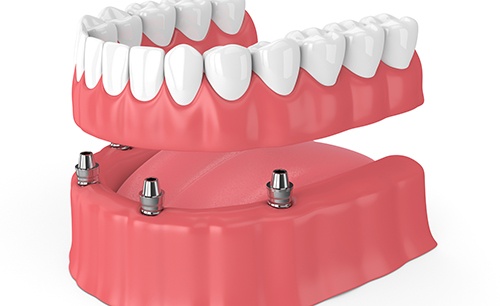Dental Implants – Columbia, MO
Strong, Beautiful Replacement Teeth That Last
If you’re missing one or more teeth, it’s important to have a replacement made as soon as possible – not just for your self-confidence, but also for your oral health and overall quality of life. At Columbia Healthy Smiles, we strongly recommend dental implants as the ideal tooth replacement for most dentistry patients. Not only do dental implants improve the health of your smile in a way that no other dental treatment can, but they also look and feel incredibly lifelike. Dr. Philip Batson, Dr. Elizabeth Abe, and the rest of our dentistry team can give you a reason to smile with dental implants in Columbia, MO. Reach out to us today to get started!
Why Choose Columbia Healthy Smiles for Dental Implants?
- Partnered with Local Dental Implant Specialists
- High-Quality, Long-Lasting Dental Restorations
- Focused on Long-Term Care for Dental Patients
What Are Dental Implants?

There are two parts to a natural tooth: the crown that you see above the gumline, and the root that is hidden underneath it. Most tooth replacements, including dentures and dental bridges, only recreate the crowns of missing teeth because they sit on top of the gums. Dental implants, on the other hand, go one step further by also bringing back the supportive root structure.
A dental implant refers to a small cylinder-shaped post that is made of biocompatible materials, usually titanium or zirconia. This post is surgically placed in the jaw, where it merges with the bone tissue and essentially becomes the root of your new teeth. A metal attachment, called an abutment, is secured on top of the implant, which allows our team to attach a custom dental crown, bridge, or denture. Because of the comprehensive structure that dental implants provide, you end up with strong, beautiful replacement teeth that last.
The 4-Step Dental Implant Process

To replace missing teeth with dental implants in Columbia, you’ll have to undergo a multi-step treatment plan to ensure their overall success. During your first visit, our team will walk you through the details of the procedure and your follow-up appointments so that you know exactly what to expect throughout the process. Until then, here are the major steps for the dental implant treatment and what you should know.
Initial Dental Implant Consultation

You’ll first undergo an initial consultation with our dental team so that we can evaluate your oral health to determine if you’re a good candidate for dental implants. One of the most important things is that your mouth will need to be healthy and free of any underlying problems before starting the procedure, as gum disease and infection can increase the risk of failure. We can also take care of any preliminary procedures, such as bone grafting, that might be necessary to ensure the success of your new teeth. Once we’ve resolved any issues and determined that you’re eligible for dental implants, we can move forward with scheduling your implant placement surgery.
Dental Implant Surgery

After your treatment has been fully planned out, we’ll refer you to a trusted oral surgeon in the area. That way, you can rest easy knowing that your procedure will be handled by a true expert. During your appointment, your team will completely numb your mouth so that you don’t feel much or any discomfort, and they might even provide sedation dentistry to help you be as calm and comfortable as possible. Once you’re ready, they’ll make small incisions in your gum line to reach your jawbone and place your implant(s) in their proper location and angle before suturing the gums around them. You’ll then have your trusted family member or friend take you home from your visit so that you can begin resting and healing.
Dental Implant Osseointegration & Abutment

It will usually take about four to six months for the implants to fuse with your jaw via osseointegration. This is the process where your metal posts become one with the bone, allowing them to work and feel like natural tooth roots. Once you’ve completely recovered and your dental implants are successful, you’ll return to our office so that we can attach your abutments—the metal connector pieces that will anchor your restorations to your metal posts.
Delivery of Dental Implant Restoration(s)

A few weeks after receiving your abutments, you’ll return to our dental office to have your lifelike restoration placed on top, completing your smile. We’ll need to make sure that your new dental crown, bridge, or denture fits perfectly with the rest of your grin so that you have a comfortable bite. Once we’ve confirmed that everything looks correct and that you’re satisfied with the results, you’ll be free to enjoy your full smile again.
Benefits of Dental Implants

Dental implants offer several benefits over other methods of tooth replacement. Because they replace the entire tooth structure rather than only focusing on the crown, dental implants provide more stability to support a balanced, nutritious diet and make it easier to speak clearly. Dental implants also stabilize the jawbone to promote better oral and overall health for a lifetime to come. Plus, they look, feel, and function more like your natural teeth than any other replacement option. Keep reading to learn more about the benefits you can enjoy with dental implants!
Day-to-Day Benefits

- Simplified maintenance: Unlike dentures, which have to be removed to clean and maintain them, dental implants will simply require normal oral hygiene habits. This means you can brush, floss, and rinse them with a mouthwash like with natural pearly whites, along with biannual checkups and cleanings with your dentist to keep them healthy.
- Munch on your favorite foods: Dental implants help you regain 80% or more of your natural biting power, allowing you to expand your dietary choices and promote better oral and overall health.
- More youthful appearance: By stimulating the jawbone, your dental implants can help improve the strength of your facial structure, allowing you to preserve a more youthful look.
- Boost in confidence: Since you won’t have to worry about your new teeth moving out of place, you can feel free to show off your pearly whites when eating, talking, and smiling.
Health Benefits

- Independence from other natural teeth: While partial dentures and bridges utilize nearby healthy teeth to close any gaps in your smile, dental implants will be directly anchored to your jawbone. This means you won’t have to risk further complications to any remaining teeth.
- Jawbone deterioration prevention: Since dental implants serve as new tooth roots, your jawbone will have the necessary stimulation to maintain its strength and structure in the long run.
Long-Term Benefits

- Save thousands of dollars: Dental implants can last a long time, meaning you can save a substantial amount of money over the years compared to traditional restorations, like dentures and bridges. They won’t require replacements as often, so you can end up saving hundreds or thousands.
- Long-lasting solution: Not only are dental implants incredibly successful (with a success rate of 95% or more even 10 years after being placed), but they also last much longer than traditional restorations. Whereas dentures and bridges will need to be replaced every several years, dental implants can last a lifetime with proper care!
Who Dental Implants Can Help

Dental implants are a versatile way to restore your smile’s appearance and functionality, regardless of how many natural teeth you have remaining. Our team in Columbia will examine your condition then recommend an appropriate treatment plan based on our findings.
Continue reading to learn more about who dental implants can help, and please don’t hesitate to contact us for additional information.
Who Is a Good Candidate for Dental Implants?

Although these restorations tend to be more resilient and longer lasting than the alternatives, that doesn’t mean they’re the best solution to meet everyone’s unique needs. Before proceeding, you’ll need to schedule a consultation so our team can determine whether you can safely undergo the procedure.
There are a few essential traits we look for in ideal candidates, including:
- Commitment to oral health. You’ll need to demonstrate that you can maintain proper preventive measures, such as brushing and flossing twice daily, to avoid potential tooth decay or gum disease that can interfere with the results.
- Good general health. This treatment involves oral surgery, so we’ll update your medical history and list any current prescriptions or supplements you’re taking to avoid doing anything that could cause adverse reactions.
- Sufficient jawbone density. Your jaw must be thick and strong enough to support your dental implants and successfully integrate the titanium rod of your implant to avoid potential failure. Sometimes, an additional bone graft procedure is required.
Missing One Tooth

Our team can refer you to a specialist who can place a single post to replace your missing tooth. Once you’ve recovered sufficiently, we’ll provide a dental crown to cap it. This tooth-shaped cap is usually made from durable ceramic that can be customized to look just like your natural enamel. Unlike dentures and dental bridges, it can function as a sturdy, standalone structure, and eventually fuses with your jawbone to become a more permanent part of your mouth.
Missing Multiple Teeth

Those missing two to four teeth in a row might be a good candidate for an implant bridge. This option involves positioning two posts into your jawbone to support a specially designed bridge that contains the correct number of pontics (artificial teeth) between two dental crowns, which anchor to your implants.
Missing All Teeth

You might think it’s not feasible to replace an entire arch with dental implants, but four to eight implants can be strategically placed to hold a specially designed set of dentures to rebuild your grin. Unlike the traditional type, these are not intended to be removed except by a professional.
Understanding the Cost of Dental Implants

The total cost of a dental implant procedure depends on a few factors, including how many teeth you are missing and how healthy your jaw is. Many patients must have a preliminary bone grafting procedure performed first, which increases the volume of the bone and adds to the overall cost of the treatment. The only way to know for sure how much your dental implants will cost is to visit our dental office. One of our experts will carefully examine your smile and the condition of your overall oral health before developing your personalized treatment plan that includes pricing information.
The Cost of Preparatory Treatments

Before we can get started with a dental implant tooth replacement plan, we may need to perform some preparatory services to ensure you achieve successful implant placement. First, we’ll review your oral and overall health history, including medications, past surgical experiences, and any adverse reactions to anesthesia. If you’re currently struggling with any oral health issues, like gum disease, we’ll start by partnering with you to achieve optimal oral health. In addition to improving oral health before treatment, we may also need to place a bone or gum tissue graft to ensure there is adequate supportive structure to anchor your dental implants.
The Cost of Dental Implant Posts

The costs of dental implants and their surgical placement will likely be the largest element impacting the costs of your tooth replacement plan. The cost of dental implants will vary dramatically based on the size of the implants, the materials they’re crafted from, and the manufacturer who makes the dental implants. After the first dental implant post, many manufacturers offer a discount for additional implants, minimizing the overall cost of more advanced dental implant tooth replacement plans.
The Cost of Abutments & Dental Implant Restorations

After the dental implants are placed, you will need to wait a few months for them to fuse with the supportive structures. Once the implant is firmly in place, we attach abutments. These attachment pieces will firmly anchor the replacement tooth to the dental implant. We’ll design your replacement crown, bridge, or denture to fit over the top of these abutments. The number of abutment posts and the types of replacement teeth will both impact the cost of your overall treatment plan.
Other Factors to Consider

In addition to the above, there are a few other factors that can impact your dental implant tooth replacement plan, including:
- The number of missing teeth and their position within the smile line.
- The materials used to craft the implant posts and replacement teeth.
- The use of dental sedation during surgical procedures to ensure comfort.
- The availability of dental insurance benefits.
Dental Implant Frequently Asked Questions
Dental implants are without a doubt the best option for replacing missing teeth. If you have questions about this tooth replacement option, find the answers below in our handy FAQ! Don’t hesitate to contact us if doubts remain when you are finished. We are always happy to talk to our patients about our quality restorative, general, and cosmetic dentistry services.
What are dental implants made of?
Most dental implants are made of titanium, a biocompatible material that promotes the growth of bone tissue to help the implants grow together with the jaw. Patients with a metal allergy or sensitivity may be able to benefit from ceramic/zirconia dental implants.
How are dental implants placed?
Dental implant placement is an oral surgery that takes place under local anesthesia, which numbs the jaw. More complex cases may be completed under general anesthesia. The gum is opened, and the implant post is placed precisely in the space where the missing tooth’s root structure was.
Am I eligible for dental implants?
If your tooth loss is recent and you are in good oral and overall health, you may indeed be a good candidate for dental implants. Schedule a consultation with our dental office to discuss your eligibility in more detail.
Where can I learn more about dental implants?
To learn more about dental implants, including how much yours might cost and whether or not you are a candidate, do not hesitate to contact Columbia Healthy Smiles! We look forward to discussing your tooth replacement options -- to help you enjoy all the benefits of a healthy, complete smile once again!
Am I Too Old to Get Dental Implants?
Patients are often surprised to hear that adults of all ages can get dental implants. That’s because candidacy for this tooth-replacement solution is determined by things like jawbone density, a commitment to good dental hygiene, and healthy gums, not age. So, if you’re 50, 60, or 70+, don’t hesitate to schedule an appointment with Dr. Batson or Dr. Abe to find out if you’re a candidate!
What Can Cause Dental Implants to Fail?
Dental implants have more than a 95% success rate, which is partly due to the extensive vetting process. That said, it is possible for them to fail as the result of chronic teeth grinding, poor oral hygiene, certain medications, and health conditions, like cancer. Rest assured, our Columbia dental team will do everything in our power to minimize your risk of dental implant failure.
How Long Do Dental Implants Last?
Dental implants can last for several decades at a time. In fact, it’s common for patients to enjoy theirs for 30 years or more if they take good care of their smile! That’s why we recommend adopting healthy habits, like brushing twice a day, coming in for a checkup and cleaning every six months, and avoiding unhealthy dental habits, like smoking and chewing on ice.
Can I Get Dental Implants If I Smoke?
Since smoking slows down the healing process, interferes with osseointegration (the fusion of your jawbone and dental implant), and increases your risk of dry mouth, it’s something we need to seriously consider. At the very minimum, patients are expected to refrain from using any and all tobacco products for two weeks prior to their procedure and for three months afterward.
Will I Have to Take Off Work for Dental Implant Surgery?
In most cases, patients are asked to dedicate one or two days to recovering from the procedure. However, there are some cases where it’s beneficial to take more time off of work, like if your job is physically demanding. In that case, we might recommend scheduling your appointment on a Thursday or Friday so you have the weekend to recover too.
Do Dental Implants Decay?
Although dental implants look extremely lifelike, they are artificial. As a result, they cannot decay. Your gums and your natural teeth, however, are still vulnerable to damage. That’s why it’s so important to continue to commit to a solid oral hygiene regimen (i.e., flossing consistently, getting a dental checkup and cleaning twice a year, keeping your intake of foods and drinks with added sugar to a minimum).
Does Getting Dental Implants Hurt?
Rest assured, our team at Columbia Healthy Smiles will go above and beyond to make the entire process of rebuilding your smile as painless as possible. That’s why we use a local anesthetic before the procedure and provide our patients with detailed aftercare instructions for when they return home.
